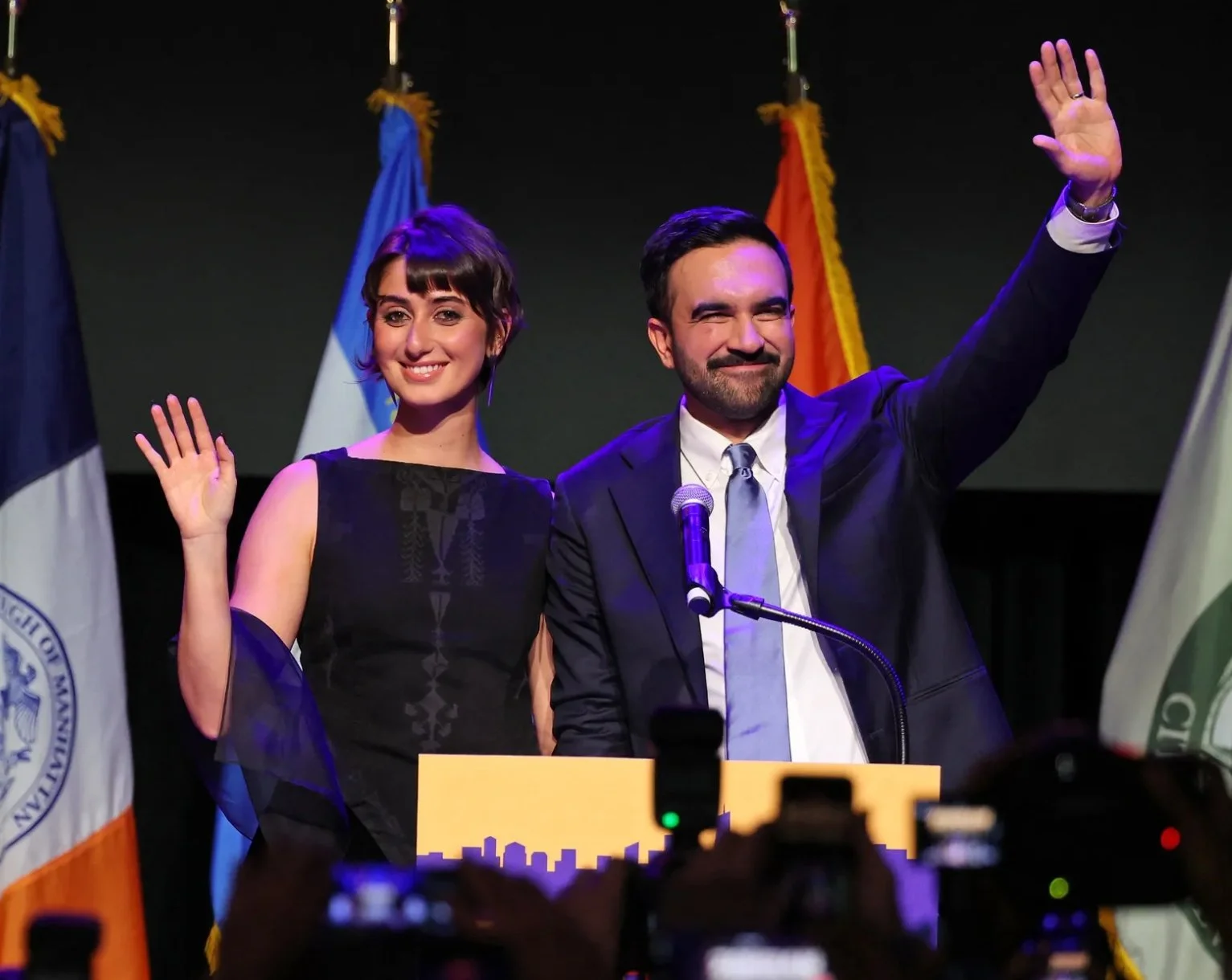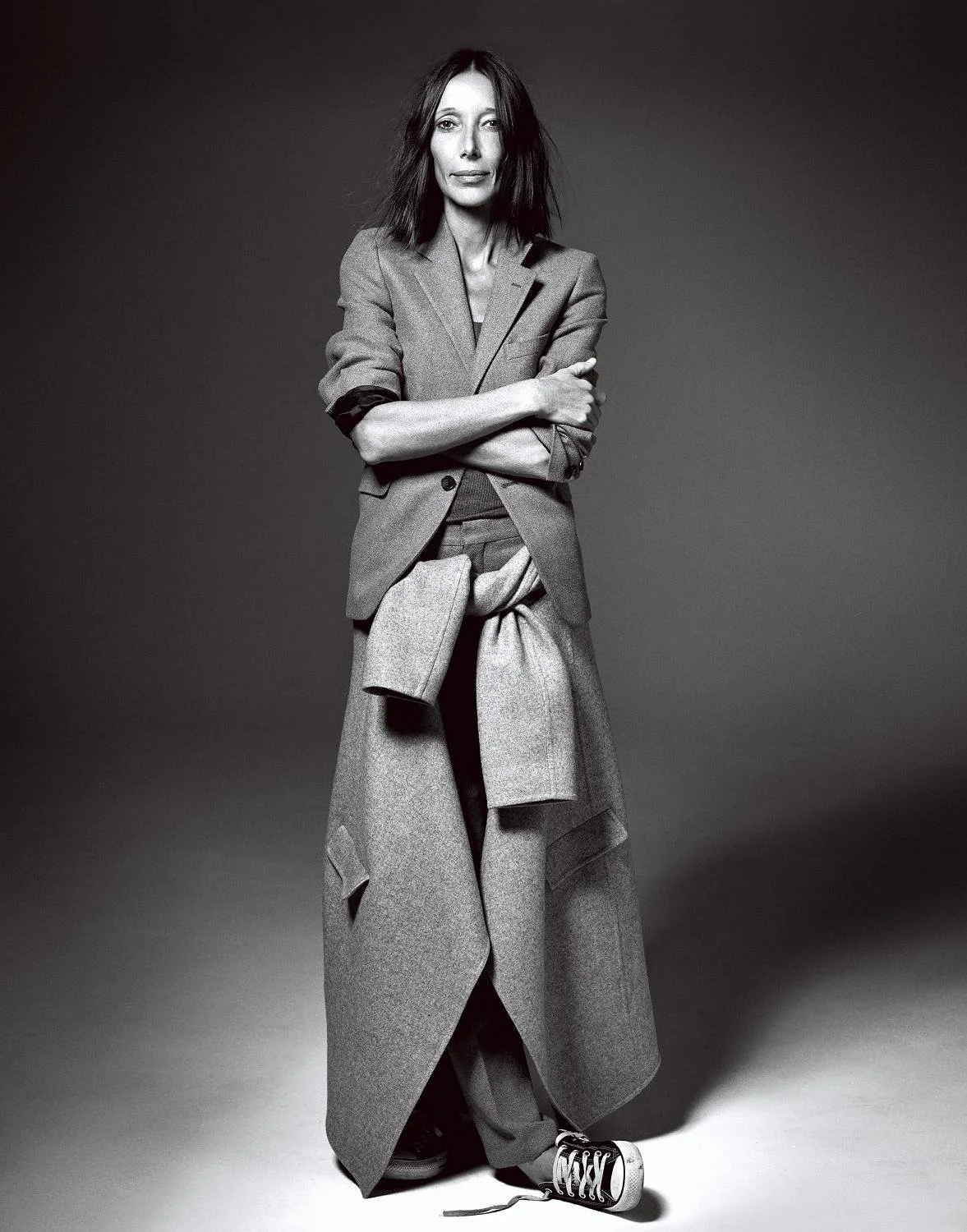Ladies and Gentlemen, We Present NY's First Lady Rama Duwaji
When Zohran Mamdani took the stage at Brooklyn Paramount Theater last night as New York's mayor-elect, he turned to his wife with words that captured the attention of everyone in the room: "To my incredible wife, Rama, hayati," he said, using the Arabic word for "my life." "There is no one I would rather have by my side in this moment, and in every moment."
Standing beside him in a carefully curated all-black ensemble was Rama Duwaji, the Syrian-American artist who would soon become New York City's First Lady. While she may have appeared as a quiet presence throughout the campaign, Duwaji's influence ran deeper than many realized, and her story deserves to be told on her own terms.
Born in Houston, Texas, in 1997, Duwaji moved to Dubai at age nine before eventually returning to the United States for her education. She graduated from Virginia Commonwealth University in 2019 with a Bachelor of Arts in Communications, then moved to New York City in 2021 to pursue her artistic career. After graduating from the School of Visual Arts, she quickly established herself in the competitive world of illustration and design.
Her client list reads like a who's who of prestigious publications and brands: The New Yorker, The Washington Post, Vogue, BBC, Apple, Spotify, VICE, and the Tate Modern. Using drawn portraiture and movement, Duwaji examines the nuances of sisterhood and communal experiences through her work. She has also taught workshops on both illustration and animation, partnering with organizations like It's Nice That in 2021. Though she primarily works digitally, Duwaji takes breaks from technology to create hand-built ceramics, combining her love for illustration and pottery to produce handmade, illustrated plates. She shares these skills through ceramic workshops as well, demonstrating the breadth of her artistic practice.
The Politics Behind the Art
While Duwaji maintained a relatively low public profile during the campaign, skipping debates, limiting social media presence, and declining interviews, her political voice has long been expressed through her art. As she wrote in an April post titled "Art in times of crisis," she believes that "Art is inherently political in how it's made, funded, and shared."
Her work has consistently addressed urgent political issues, from the Middle East to immigration. In May, she created a powerful animation of a young Palestinian girl holding a large empty pot with the words "Not a hunger crisis" emblazoned across it, which then transitioned to an aerial view of people holding similarly empty vessels overlaid with text reading, "It is deliberate starvation." She captioned the piece: "As I was making this, Israel has been bombing Gaza nonstop with consecutive airstrikes. Keep your eyes on Gaza and support."
Duwaji has also been outspoken about ICE and immigration enforcement. Following activist Mahmoud Khalil's arrest in March, she created an illustration of him with a pointed caption: "On Saturday night, Mahmoud Khalil, a Palestinian-Algerian activist, was snatched by ICE from his Columbia-owned apartment in NYC without notice. This is an attack on freedom of speech, and sets a scary f**king precedent for anyone who speaks up for what's right. Resist."
A Modern Love Story
The couple's relationship began in the most millennial way possible: they connected on Hinge. They married in February at the City Clerk's office, just months before Mamdani's historic mayoral campaign would thrust them both into the spotlight. He became the first candidate to win more than 1 million votes since 1969, doing so despite a racist smear campaign funded by billionaires. Throughout it all, he never stopped being outspoken in his support for Palestine.
When right-wing critics targeted Duwaji for her quiet campaign presence, Mamdani defended her forcefully on social media in May, sharing photos from their wedding.
"If you take a look at Twitter today, or any day for that matter, you know how vicious politics can be. I usually brush it off, whether it's death threats or calls for me to be deported. But it's different when it's about those you love," he wrote. "Three months ago, I married the love of my life, Rama, at the City Clerk's office. Now, right-wing trolls are trying to make this race – which should be about you – about her."
He continued: "Rama isn't just my wife, she's an incredible artist who deserves to be known on her own terms. You can critique my views, but not my family."
The Hidden Hand Behind the Campaign
While Duwaji may have been absent from rallies and debates, her artistic fingerprints were all over the campaign. She helped finalize the campaign's brand identity, including crucial details like iconography, font choices, and the color palette. The distinctive combination of orange-yellow, blue backgrounds, and firehouse red that became synonymous with Mamdani's campaign? That was Duwaji's vision. She remained a major force behind her husband's digital and social media presence throughout the year-long campaign.
A Statement Through Fashion
At the victory celebration, Duwaji demonstrated her sophisticated understanding of visual communication, appropriate for an artist who, as observers noted, "understands the craft of image-making, and just how much visuals matter." She seems to avoid big brands in favor of independent entrepreneurs, dressing up just enough to situate herself in the middle ground between socialism and high society.
She wore a sleeveless black denim top from Zeid Hijazi, a Palestinian designer based in London whose work combines heritage embroidery with futuristic techniques and has appeared in the Victoria and Albert Museum. Laser-etched with what appeared to be classic tatreez motifs, the top was simultaneously personal (reflecting Duwaji's engagement with Palestinian trauma in her work), downtown, and elegantly classic.
She paired it with a flowy mid-calf black velvet-and-lace skirt from New York-based designer Ulla Johnson, part of the Fashion Week establishment whose work is popular with the boho crowd. The outfit said she was neither one cliché nor the other; she was simply and beautifully herself.
A New Chapter For Us All
As Mamdani addressed supporters on election night, speaking to "all people of all faiths" clearly demonstrating that the left is the antidote to a right that so obviously embraces division, Duwaji stood beside him, not as a silent partner, but as an accomplished artist with her own voice, her own vision, and her own contributions to their shared victory.
Her husband owes his victory to many factors: a broken economic and political system, the people's fury over genocide that secured his Democratic nomination, and a grassroots movement that proved you don't need millions in AIPAC money to win. But he also owes it, in part, to the woman standing beside him—the artist who helped shape how New York saw his campaign. As New York prepares for this new chapter, Rama Duwaji steps into her role as our First Lady not as someone who needs to be defined by her husband's position, but as someone who has already defined herself—as an artist, an activist, and a partner who chose to support her husband's vision while never compromising her own.
A Cautious Hope: What Mamdani's Victory Means
I'll admit, I don't believe in politics in general. And I have real fear that Mamdani won't be able to execute on expectations in a city as demanding as New York—particularly with threats to cut funding to the city now that he's won. But despite my skepticism, there's something undeniable about this moment: the people have spoken. Change is here. This is an eye-opening moment for all of us, and perhaps most importantly, it's a sign that the Democrats need to wake up and realize that part of their huge failure was not listening to the people and our demands for our humanity, not a failed system that serves everyone but us.
These are such interesting times—dark times, to be honest. But now we feel a tiny beacon of light. That's what Mamdani represents to so many of us. Are the expectations high? Not really. New York has felt like Gotham in Batman ever since the pandemic, a city struggling to remember itself. But maybe that's exactly why this matters. It's time the people prove why this is still the best city in the world. Not because of its buildings or its institutions, but because of its people—the same people who showed up and made their voices heard, despite everything working against them.
Written by Leila Antakly






